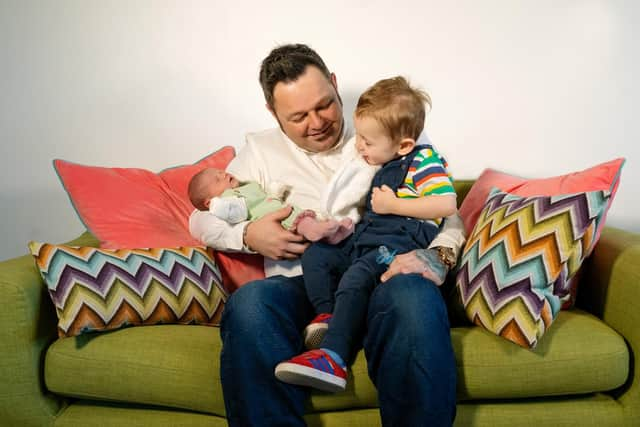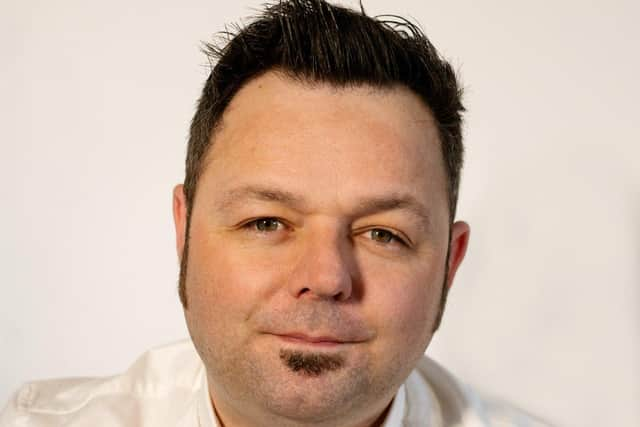‘It would have helped if we’d been been asked how we were coping’ - Derry father backs NSPCC campaign
and live on Freeview channel 276
Over the last year, the world has changed beyond all recognition and the effects of the coronavirus pandemic have been felt by almost everyone.
Many new parents have had a tough time as they have not been able to enjoy the usual support of family and friends but for those parents experiencing perinatal mental health issues, it has been especially difficult. We know that perinatal mental health problems are some of the most common complications that a woman can experience when having a baby, with up to one in five women affected during pregnancy and in the year after birth. If left untreated, they can have devastating consequences for women, babies and families.
Advertisement
Hide AdAdvertisement
Hide AdAt NSPCC, we are particularly concerned about the potential impact on the future health, wellbeing and life chances of babies born during the pandemic, as parents face heightened stress and social isolation. At this difficult time, it’s crucial no parent or baby is left behind and the services they need are there to support them – wherever they live.
Earlier this year, there was a very welcome announcement from the Minister of Health on the release of funding for perinatal mental health community teams across all five health and social care trusts. Truly, this is a landmark moment for all stakeholders across Northern Ireland, including the NSPCC, who have been campaigning on this issue for several years. Through the NSPCC’s Fight for a Fair Start campaign, we have been calling for families to have access to the support that parents and babies need for a healthy and happy start in life. We are asking the public to continue to support the campaign by backing the NSPCC’s petition for change. The new perinatal mental health community teams will provide much-needed support for mums who experience severe difficulties with their mental health. We also need a mother and baby unit for mums who require inpatient care. Additionally, we must make sure the system works for mums and dads who need support for mild-to-moderate mental health problems through primary health care. And even when mums and dads get support for their mental health, additional support may be required to look after their babies’ developmental needs.
Derry father
One person who knows first-hand about this issue is Gary who lives in Derry and his story is featured in the new NSPCC campaign video which highlights some of the issues experienced by new parents. He is 34 years old and is a dad to five children, two older children from a previous relationship, two sons aged five and two, and a baby daughter born in lockdown.
He believes his wife Shannen never received the right support for her mental health after their youngest son was born and thinks checking in on parents’ mental health as part of the routine checks carried out after a baby is born is vital. As a dad who struggles with his mental health, he explains while he feels a responsibility to support his partner and family, he also believes there should be more support available to help parents to do this. His partner had a difficult and painful first pregnancy and he was very concerned about her health and her second pregnancy was also a stressful time.


Advertisement
Hide AdAdvertisement
Hide AdGary describes it like this: “When Shannen went into labour, the whole experience happened very quickly and left us reeling. We were told when we arrived at the hospital it was ‘early stages’ and ‘Dad, you can go home’. Shannen wanted me to stay and we were stressed at the idea of being separated, but we felt we had to listen to the professionals. I’d barely left the hospital before my mobile rang and I was being called back. I had to rush, panicking that I’d miss my son’s birth and that Shannen would have no one with her if I didn’t make it. I got there just in time. If I had missed that important moment, I would have regretted it for the rest of my life.”
Once the baby was brought home, Gary was concerned about his partner. He said: “I believe Shannen suffered from some kind of post-natal depression (PND) at that time and don’t feel there was enough checking up on her mental health afterwards, partly because everything was so rushed. I suffer from mental health difficulties myself, which Shannen has supported me through, so I recognised some of her symptoms as similar to the things I do when I’m struggling. I noticed over those first few months she was avoiding questions, and she was crying frequently – anything to do with ‘real life’ on TV and she would burst into tears.
“We talked about it together and I made sure she knew I understood she wasn’t feeling like her usual self. Some dads in my age group might not know what to do if they or their partner is struggling after a baby arrives. My experience and awareness of mental health aren’t a given for all new parents. As a family, our approach is to rally together in difficult times, so that’s what we did, with little-to-no outside help. We tend to feel like we want to be responsible for ourselves but it still would have helped to have been asked how we were coping.
“The focus of all appointments and check-ups during pregnancy was on Shannen, but after our baby was born that changed. The majority of the visits from care workers that followed our son’s birth were solely about the checks on the baby. When these were done they’d say ‘Ok, see you in 4-6 weeks’ and off they’d go. It would have been helpful if every one of those conversations had started with ‘First, how are you both feeling?’ and ‘Anything you might want to ask?’


Advertisement
Hide AdAdvertisement
Hide Ad“I found out about NSPCC’s Fight for a Fair Start campaign through my work with The Dad’s Project, an initiative in Northern Ireland that has supported me with my mental health-related to being a separated dad from my older children. I’m currently training to be able to offer mental health support to other dads and so I know from experience that it is very important that dads are part of conversations about mental health, new dads included. I was delighted to be involved with the NSPCC’s video and have the opportunity to tell my story. I hope it will help other people speak up and ask for help if they need to.”
While progress in Northern Ireland on perinatal mental health has been made, there are still some areas that need to be progressed. We are asking for continued support for our Fight for a Fair Start campaign and calling on the public to back the NSPCC’s petition for change so that all families have access to the support that parents and babies need for a healthy and happy start in life.
You can sign the petition at: e-activist.com/page/75431/petition/1For more information on Fight for a Fair Start, visit: www.nspcc.org.uk/support-us/campaigns/fight-for-a-fair-start/